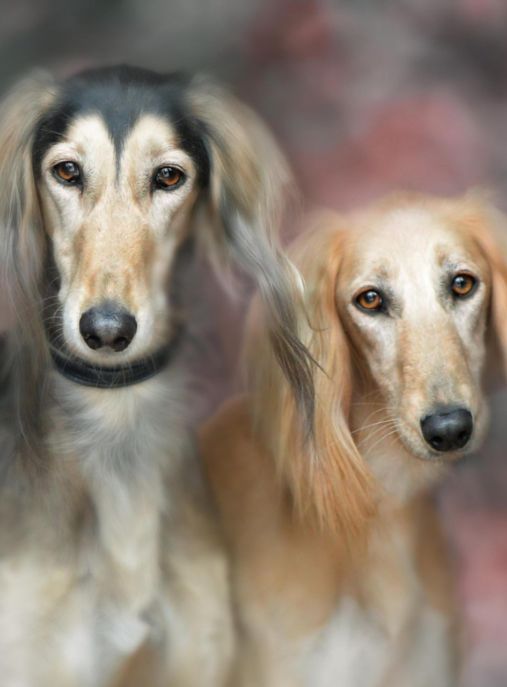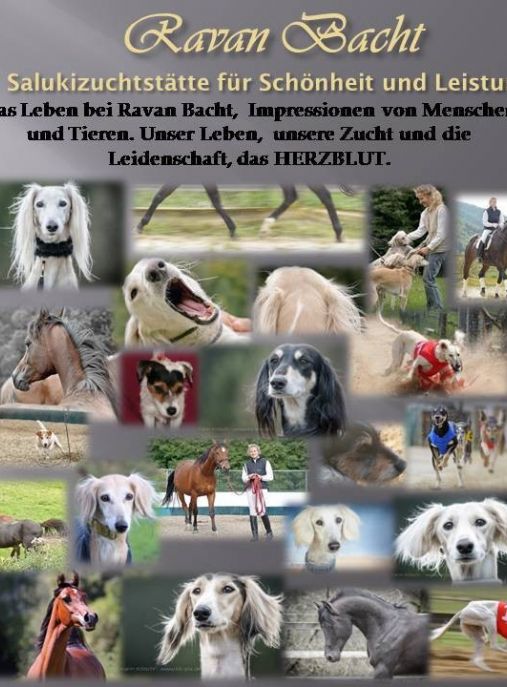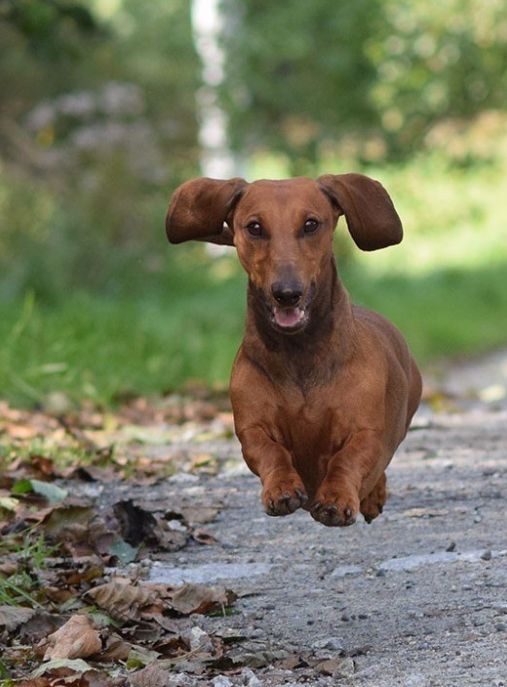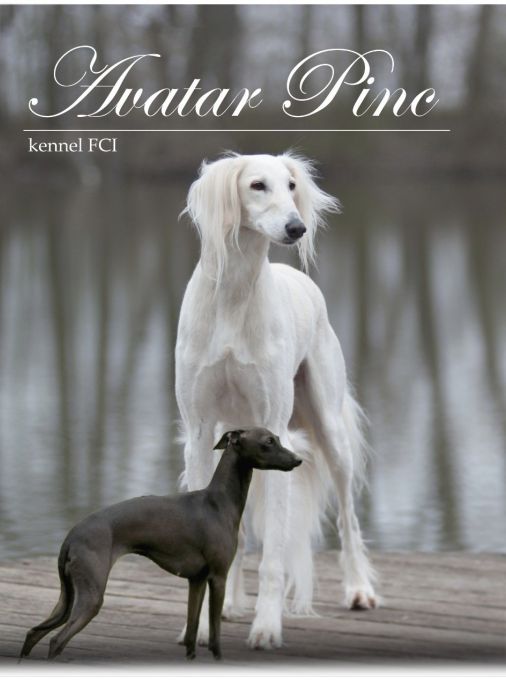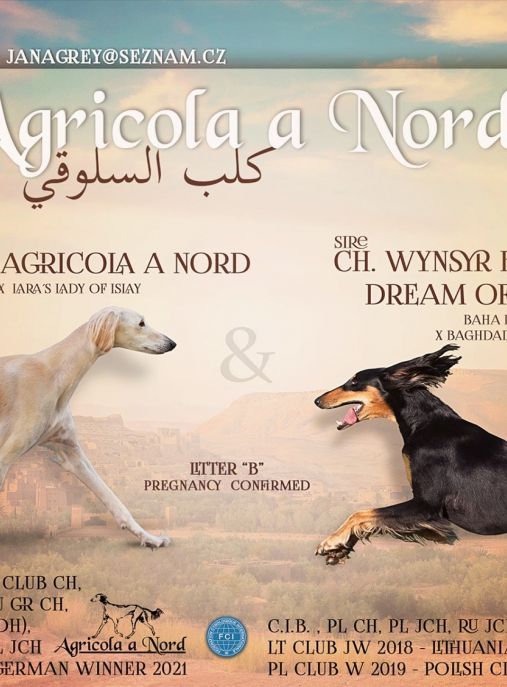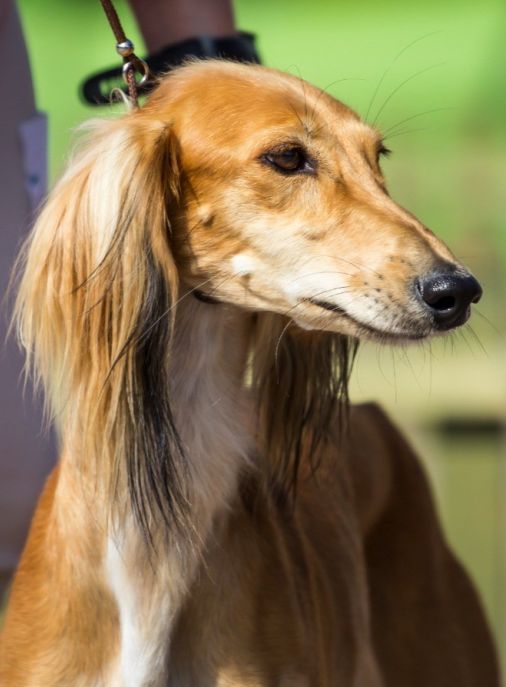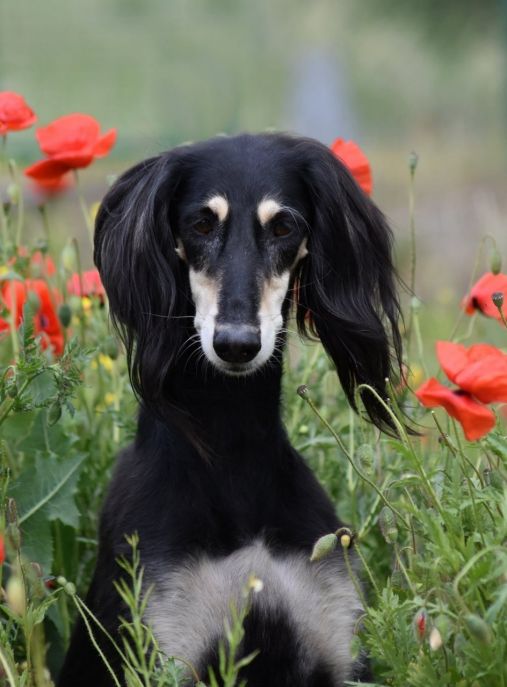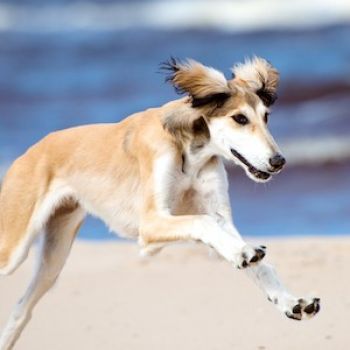The Saluki, also known as the Persian Greyhound, is a regal and elegant breed of dog that has captivated the hearts of many dog enthusiasts around the world. With their slender and graceful appearance, the Saluki is often considered one of the most beautiful dog breeds. This breed is known for its incredible speed, endurance, and loyalty, making it a popular choice for both show and companion purposes.
The history of the Saluki breed can be traced back thousands of years to ancient Egypt and Mesopotamia. These dogs were highly revered by the Bedouin tribes, who considered them to be sacred and believed that they possessed the ability to bring good fortune. Salukis were often depicted in ancient Egyptian art and were even mummified alongside their owners to accompany them in the afterlife.
According to the FCI (Fédération Cynologique Internationale) typology, the Saluki belongs to Group 10, which includes Sighthounds. Sighthounds are a group of dogs that have been bred for their exceptional speed and keen eyesight, enabling them to chase and capture prey. The Saluki is classified under Section 1: Long-haired or Fringed Sighthounds.
Salukis are primarily bred for their hunting abilities, particularly in chasing down gazelles and other swift game. Their slender build, long legs, and deep chest allow them to reach incredible speeds, often exceeding 40 miles per hour. Despite their hunting background, Salukis also make excellent family pets and are known for their gentle and affectionate nature.
In terms of physical characteristics, the Saluki is a medium-sized dog with a height ranging from 23 to 28 inches (58 to 71 cm) at the shoulder. The weight of a Saluki typically falls between 40 to 65 pounds (18 to 29 kg), with males being slightly larger than females. Their coat is silky and smooth, with feathering on the ears, tail, and legs. Salukis come in a variety of colors, including white, cream, fawn, golden, red, grizzle, black, and tan.
The life expectancy of a Saluki is generally between 12 to 14 years, although some individuals have been known to live even longer with proper care. This breed is generally healthy, but like many purebred dogs, they may be prone to certain genetic conditions such as hip dysplasia, heart problems, and certain eye diseases. Regular veterinary check-ups, a balanced diet, and regular exercise are essential to ensure the overall well-being of a Saluki.
One interesting fact about Salukis is their incredible jumping ability. They are known to effortlessly clear fences and obstacles, making it crucial for owners to have secure and high fences to prevent them from escaping. Additionally, Salukis have a strong prey drive and may not be suitable for households with small pets such as cats or rabbits, as they may see them as potential prey.
Salukis are intelligent and independent dogs, which can sometimes make training a bit challenging. They require patient and consistent training methods, preferably using positive reinforcement techniques. Early socialization is also crucial to ensure that they grow up to be well-rounded and confident dogs.
In conclusion, the Saluki is a magnificent breed with a rich history and remarkable physical abilities. Whether as a hunting companion or a beloved family pet, the Saluki's beauty, grace, and loyalty make it a truly exceptional breed. With proper care, training, and love, the Saluki can bring joy and companionship to any household lucky enough to have one.
The Saluki dog, also known as the Persian Greyhound, is a breed that exudes elegance, grace, and a regal demeanor. With their slender bodies, long legs, and silky coats, Salukis are often considered one of the most beautiful dog breeds. However, their character goes far beyond their physical appearance.
Salukis are known for their independent and aloof nature. While they are deeply loyal to their families, they tend to be reserved with strangers. This reserved behavior is not to be mistaken for aggression; rather, it is a reflection of their inherent cautiousness. Salukis are naturally observant and take their time to assess new situations and people before fully engaging.
Despite their reserved nature, Salukis are incredibly gentle and sensitive dogs. They thrive on love and affection from their human companions and are known to form strong bonds with their families. However, they may not be the best choice for families with young children, as their delicate nature can make them more susceptible to accidental injuries.
Salukis have a strong prey drive, which stems from their history as hunting dogs. They have an innate instinct to chase and capture small animals, so it is crucial to keep them on a leash or in a securely fenced area when outside. Their incredible speed and agility make them exceptional runners, and they can easily outrun most other dog breeds.
When it comes to training, Salukis can be a bit challenging. Their independent nature means they are not always eager to please their owners, and they may require a patient and consistent approach. Positive reinforcement techniques, such as treats and praise, work best with this breed. Harsh training methods or punishment can lead to fear or mistrust, which can be detrimental to their overall well-being.
Socialization is key for Salukis, especially during their puppyhood. Exposing them to various people, animals, and environments from an early age will help them develop into well-rounded dogs. It is important to note that Salukis have a strong instinct to chase, so they should always be supervised around small animals, including cats.
Salukis are not known for their watchdog abilities. They are generally quiet dogs and are more likely to observe and assess a situation rather than bark to alert their owners. However, their keen senses make them excellent sight hounds, and they can spot movement from a great distance.
In terms of exercise, Salukis require a fair amount of physical activity to keep them happy and healthy. They enjoy regular walks, but they truly thrive in open spaces where they can run freely. A securely fenced yard or a safe, enclosed area is ideal for them to stretch their long legs and indulge in their natural instinct to chase.
In conclusion, Salukis are a unique and captivating breed with a character that is both independent and gentle. They require patient training, early socialization, and plenty of exercise to ensure their well-being. With the right care and attention, Salukis can make wonderful companions for individuals or families who appreciate their regal beauty and dignified nature.
Saluki dogs are elegant and graceful creatures known for their incredible speed and endurance. Originating from the Middle East, they have been bred for centuries as hunting companions and companions to royalty. If you are fortunate enough to have a Saluki as a pet, it is essential to provide them with the proper care and attention they deserve. Here are some tips on how to care for Saluki dogs, including what to do and what not to do.
First and foremost, Salukis require regular exercise to maintain their physical and mental well-being. They are sighthounds, which means they have a strong prey drive and love to chase after anything that catches their eye. It is crucial to provide them with a safe and secure area to run and play, such as a large fenced yard or a well-maintained dog park. Daily walks and occasional off-leash activities in a secure area are also recommended.
Salukis have a thin coat that offers minimal protection from extreme weather conditions. Therefore, it is vital to provide them with appropriate shelter and protection. During hot weather, ensure they have access to shade and fresh water at all times. In colder climates, consider providing them with a warm and comfortable dog coat or sweater to keep them cozy during walks or outdoor activities.
Grooming is another essential aspect of Saluki care. Their coat is silky and smooth, and it requires regular brushing to prevent matting and tangling. A soft-bristle brush or a grooming mitt can be used to remove loose hair and keep their coat looking its best. Salukis are generally clean dogs and do not have a strong odor, so bathing should only be done when necessary to avoid drying out their skin.
Salukis are known for their independent nature and can be somewhat aloof with strangers. However, they are incredibly loyal and affectionate with their families. It is crucial to provide them with plenty of socialization from an early age to ensure they are comfortable and well-behaved around other people and animals. Expose them to various environments, sounds, and experiences to help them become well-rounded and confident dogs.
When it comes to training, Salukis are intelligent but can be somewhat stubborn. Positive reinforcement techniques, such as treats, praise, and rewards, work best with this breed. Harsh training methods or punishment should be avoided as they can damage the trust and bond between you and your Saluki. Consistency, patience, and gentle guidance will yield the best results.
Salukis have a strong prey drive, so it is crucial to keep them on a leash or in a securely fenced area when outside. They have been known to chase after small animals, including squirrels, rabbits, or even smaller dogs, which can lead to accidents or injuries. Additionally, Salukis are not recommended for households with small pets such as cats, as their hunting instincts may be triggered.
Lastly, Salukis thrive on human companionship and are not suited for long periods of isolation. They are happiest when they are part of a loving and active family. If you are away from home for extended periods, consider providing them with interactive toys or puzzles to keep them mentally stimulated and prevent boredom.
In conclusion, caring for a Saluki requires providing them with regular exercise, appropriate shelter, grooming, socialization, and positive training techniques. Avoiding harsh methods, keeping them on a leash or in a secure area, and ensuring they receive ample human companionship are also essential. With the right care and attention, your Saluki will be a loyal and loving companion for many years to come.
The Saluki dog breed is renowned for its elegance, grace, and beauty, and one of the factors that contribute to their striking appearance is their common color. Salukis come in a variety of colors, but one of the most common and visually captivating is the sandy or fawn color.
The sandy or fawn color of Saluki dogs is reminiscent of the desert landscapes from which they originated. It is a warm and earthy hue that exudes a sense of tranquility and harmony. This color is often described as a light tan or beige, with variations ranging from a pale cream to a rich golden shade.
The sandy or fawn Saluki possesses a coat that is smooth, silky, and flowing, enhancing the overall allure of their color. The texture of their fur adds depth and dimension to their appearance, creating a mesmerizing effect when they move. The coat is often short on the head and ears, gradually lengthening along the body, forming a beautiful feathering on the tail and legs.
The sandy or fawn Saluki's coat is typically solid in color, with minimal markings or patterns. This simplicity allows the natural beauty of their hue to shine through, emphasizing their regal and refined features. The absence of complex patterns or markings further accentuates their sleek and streamlined physique, making them appear even more graceful and statuesque.
In certain lighting conditions, the sandy or fawn color of Saluki dogs can exhibit subtle variations and undertones. Under sunlight, their coat may appear to have a golden sheen, radiating warmth and vitality. In shaded areas or during twilight, their color may take on a softer and more subdued tone, exuding an air of tranquility and serenity.
The sandy or fawn Saluki's color is not only visually appealing but also serves a practical purpose. Their coat color allows them to blend seamlessly with their natural surroundings, making them excellent hunters and providing them with an advantage in their desert habitat. This adaptive coloration enables them to move swiftly and silently, ensuring their success in capturing prey.
Whether they are standing majestically or gracefully sprinting across open terrain, the sandy or fawn Saluki's color is a testament to their timeless beauty and elegance. It is a hue that perfectly complements their regal stature and noble demeanor, captivating all who have the pleasure of beholding them.
In conclusion, the sandy or fawn color of Saluki dogs is a captivating and visually striking hue that enhances their overall elegance and grace. Its warm and earthy tones, combined with the smooth and flowing texture of their coat, create a mesmerizing effect. This color allows them to blend seamlessly with their surroundings while accentuating their regal features. The sandy or fawn Saluki's color is a true testament to their timeless beauty and serves as a reminder of their origins in the desert landscapes.
The Saluki, also known as the Persian Greyhound, is a graceful and elegant breed of dog that has been cherished for centuries for its beauty and hunting prowess. While generally a healthy breed, Salukis, like any other dog, can be prone to certain health issues. Understanding these common diseases and taking appropriate care can help ensure the overall health and well-being of Saluki dogs.
One of the most prevalent health concerns in Salukis is cancer. This breed has a higher risk of developing various types of cancer, including lymphoma, osteosarcoma, and hemangiosarcoma. Regular veterinary check-ups and early detection are crucial in managing and treating cancer in Salukis. Additionally, maintaining a healthy lifestyle, providing a balanced diet, and avoiding exposure to environmental toxins can help reduce the risk of cancer.
Another common health issue in Salukis is heart disease. Dilated cardiomyopathy (DCM) is a condition where the heart muscle weakens, leading to an enlarged heart and reduced ability to pump blood effectively. Regular cardiac screenings and an appropriate diet, including taurine supplementation if necessary, can help manage DCM in Salukis.
Salukis are also prone to certain genetic eye diseases, such as progressive retinal atrophy (PRA) and cataracts. PRA is a degenerative condition that leads to progressive vision loss, while cataracts cause clouding of the lens, leading to impaired vision. Regular eye examinations by a veterinary ophthalmologist can help detect these conditions early on, allowing for appropriate management or surgical intervention if needed.
Like many deep-chested breeds, Salukis are at risk of developing bloat, also known as gastric dilatation-volvulus (GDV). This life-threatening condition occurs when the stomach fills with gas and twists, cutting off blood supply to vital organs. Feeding multiple small meals throughout the day, avoiding exercise immediately after meals, and using elevated feeding bowls can help reduce the risk of bloat in Salukis.
Maintaining a healthy weight is crucial for the overall well-being of Salukis. Obesity can lead to various health issues, including joint problems, diabetes, and heart disease. Providing a balanced diet, regular exercise, and monitoring calorie intake can help prevent obesity in Salukis.
Regular grooming is essential for the health and comfort of Salukis. Their long, silky coats require regular brushing to prevent matting and to keep the skin and coat healthy. Additionally, routine dental care, including regular brushing and professional cleanings, can help prevent dental diseases, such as periodontal disease and tooth loss.
Lastly, mental stimulation and socialization are vital for the overall health and happiness of Salukis. These intelligent dogs thrive on mental challenges and require regular exercise to prevent boredom and destructive behaviors. Engaging in activities like obedience training, agility, and regular playtime can help keep Salukis physically and mentally stimulated.
In conclusion, while Salukis are generally a healthy breed, they can be prone to certain health issues. Regular veterinary check-ups, early detection, appropriate diet, exercise, grooming, and mental stimulation are key to maintaining the health and well-being of Saluki dogs. By being proactive and providing the necessary care, Saluki owners can ensure their beloved companions lead long, happy, and healthy lives.
The Saluki dog, also known as the Persian Greyhound, is a majestic and elegant breed that requires a well-balanced and nutritious diet to maintain optimal health and performance. These dogs have a unique metabolism and specific dietary needs that should be taken into consideration when planning their meals. In this text, we will explore the nutrition requirements of Saluki dogs, provide advice on feeding them, and highlight foods to avoid.
Protein is an essential component of a Saluki's diet as it supports muscle development and repair. High-quality animal-based proteins such as lean meats (chicken, turkey, beef) and fish are excellent choices. These proteins should make up the majority of their diet, ideally accounting for around 50-60% of their daily caloric intake. It is important to ensure that the meat is cooked thoroughly to eliminate any potential bacteria or parasites.
Carbohydrates are another crucial aspect of a Saluki's nutrition. Complex carbohydrates like whole grains (brown rice, quinoa, oats) and vegetables (sweet potatoes, carrots, broccoli) provide a steady release of energy and are rich in fiber, aiding in digestion. These should constitute approximately 30-40% of their daily caloric intake. Avoid simple carbohydrates such as white bread or sugary treats, as they can lead to weight gain and energy spikes.
Healthy fats are also necessary for Saluki dogs, as they provide energy and support various bodily functions. Incorporate sources of omega-3 fatty acids, such as fish oil or flaxseed oil, into their diet. These fats promote a healthy coat, reduce inflammation, and support brain function. However, it is important to moderate the fat intake, as excessive amounts can lead to weight gain and related health issues.
Saluki dogs have a relatively low appetite compared to other breeds, so it is crucial to feed them smaller, more frequent meals throughout the day. Dividing their daily food portion into two to three meals will help prevent overeating and maintain a healthy weight. Free-feeding or leaving food out all day is not recommended, as it can lead to obesity.
When it comes to treats, opt for healthy and natural options. Avoid treats that are high in fat, sugar, or artificial additives. Instead, choose treats made from lean meats or fruits and vegetables. These can be used as rewards during training sessions or as occasional snacks.
While many human foods are safe for dogs, some can be toxic or harmful to Salukis. Foods to avoid include chocolate, grapes, raisins, onions, garlic, caffeine, alcohol, and anything containing xylitol (a sugar substitute). These foods can cause severe health issues, including kidney damage, anemia, and even death. It is always best to consult with a veterinarian before introducing any new foods into your Saluki's diet.
In conclusion, a well-balanced and nutritious diet is essential for the health and well-being of Saluki dogs. Prioritize high-quality proteins, complex carbohydrates, and healthy fats while avoiding foods that can be harmful. Remember to feed them smaller, frequent meals and choose treats wisely. By providing proper nutrition, you can ensure that your Saluki thrives and enjoys a long and healthy life.
